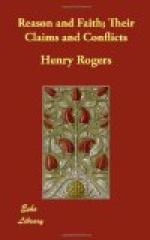But it may be said, ’May not we be permitted, while conceding the miraculous and other evidences of Christianity, and the general authority of the records which contain it, to go a step further, and to reject some things which seem palpably ill-reasoned, distasteful, inconsistent, or immoral?’ ’Let every man be fully persuaded in his own mind.’ For ourselves, we honestly confess we cannot see the logical consistency of such a position; any more than the reasonableness, after having admitted the preponderant evidence for the great truth of Theism, of excepting some phenomena as apparently at variance with the Divine perfections; and thus virtually adopting a Manichaean hypothesis. We must recollect that we know nothing of Christianity except from its records; and as these, once fairly ascertained to be authentic and genuine, are all, as regards their contents, supported precisely by the same miraculous and other evidence; as they bear upon them precisely the same internal marks of artlessness, truth, and sincerity; and, historically and in other respects, are inextricably interwoven with one another; we see not on what principles we can safely reject portions as improbable, distasteful, not quadrating with the dictates of reason;’ our ‘intuitional consciousness,’ and what not. This assumed liberty, however is, as we apprehend, of the very essence of Rationalism; and it may be called the Manichaeism of interpretation. So long as the canonicity of any of the records, or any portion of them, or their true interpretation, is in dispute, we may fairly doubt; but that point once decided by honest criticism, to say we receive such and such portions, on account of the weight of the general evidence, and yet reject other portions, though sustained by the same evidence, because we think there is something unreasonable or revolting in their substance, is plainly to accept evidence only where it pleases us, and to reject it where it pleases us not. The only question fairly at issue must ever be whether the general evidence for Christianity will overbear the difficulty which we cannot separate from the truths. If it will not, we must reject it wholly; and if it will, we must receive it wholly. There is plainly no tenable position between absolute infidelity and absolute belief. And this is proved by the infinitely various and Protean character of Rationalism, and the perfectly indeterminate, but always arbitrary, limits it imposes on itself. It exists in all forms and degrees, from a moderation which accepts nearly the entire system of Christianity, and which certainly rejects nothing that can be said to constitute its distinctive truth, to an audacity of unbelief, which, professing still vaguely to reverence Christianity as ‘something divine,’ sponges out nine tenths of the whole; or, after reducing the mass of it to a caput mortuum of lies, fiction, and superstitions, retains only a few drops of fact and doctrine,—so few as certainly not to pay for the expenses of the critical distillation.*




